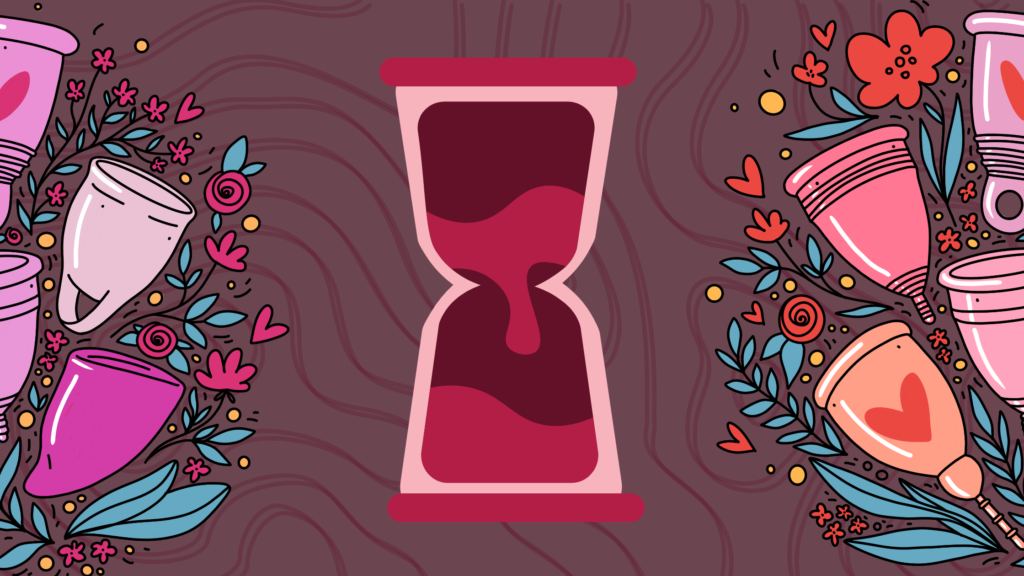The Muse Inks
That’s What (S)He Said: How People’s Opinions Affected My Body Image
by Gabrielle Lopez
May 31, 2025
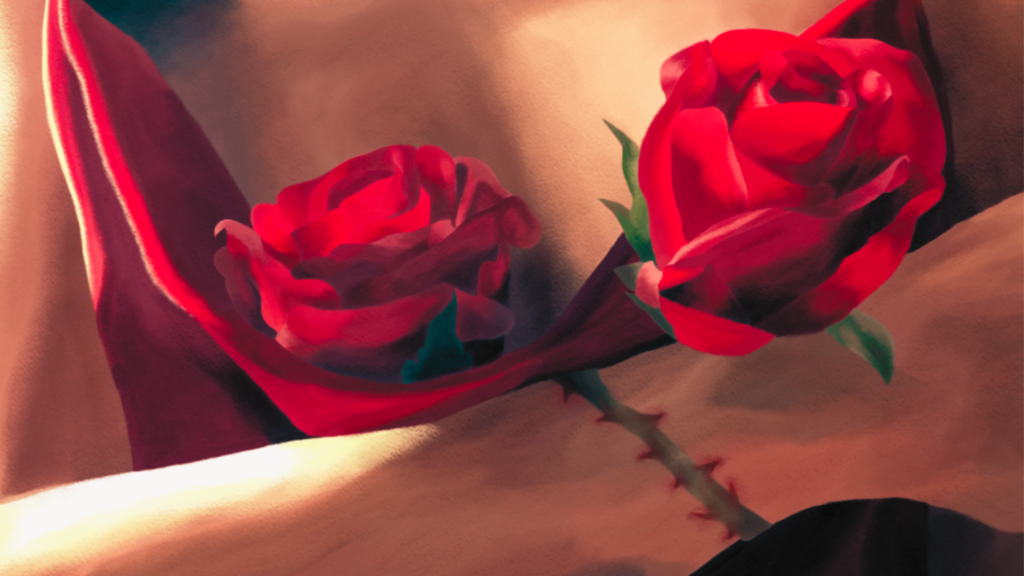
Ninth grade and still flat-chested.”
This is what a photographer said to me after our photoshoot for a school event. He was an alumni, and I was still studying in high school, so he got me as one of the models.
We were making small conversation one night over chat. I was being polite, entertaining his questions even though deep down, I was wondering if he should even be interested in a minor like me. At one point, he asked me how old I was, what year level I was in. I said I was in the ninth grade. I thought he was going to ask about how my studies were going, how much had changed in our school since his time, or maybe even what course I was planning to take soon enough.
But that’s what he said. “Ninth grade and still flat-chested.”
I didn’t have anyone to talk to about it. It was 2016; body shaming wasn’t called out yet. And anyway, I’ve never liked talking to anyone about my body. Not that it stopped people from talking to me about it.
“You still have a chance if you get pregnant.”
This is what a “friend” said after our Health class discussion about pregnancy and how a woman’s body changes through it. We were at the lockers, fixing our stuff and getting ready to go. I don’t even think we were having a conversation in the first place, but he said that out of the blue, and I just laughed it off like it was no big deal.
I didn’t have anyone to talk to about it. It was 2016; body shaming wasn’t called out yet. And anyway, I’ve never liked talking to anyone about my body. Not that it stopped people from talking to me about it.
“Sixteen, but you still don’t have boobs…I hope that when I come back, you’ll have them already.”
It wasn’t even the words that hurt—because maybe at that point, I had already gotten used to people saying things like this. No, what hurt more was who said it.
He was—in a way I could only call somebody who didn’t want to commit to a relationship with me, nor I with him—my special someone at the time. Someone who would have been a boyfriend, a partner, but now that I look back on it, thank God he wasn’t and would never be. But back then, he was someone I thought I loved and I thought loved me back.
But how can someone say they love you but also say something to hurt you? How can someone be the one person you trust yourself with but also be the same person to wound you in the deepest way possible?
Was it so he could show me off as his to touch and own? Was it for his own preference, his own pleasure that he wanted my body to be something it wasn’t? Was the reason why he never called me his girlfriend my body, this apparent lacking in it?
I don’t remember what we were talking about before we talked about my body. But he asked me how old I was, as if he didn’t know; we literally just spent my 16th birthday together. He pointed to my chest, then he said those words as if it was his birthday to wish on. As if he had a say on what my body should be or had a claim to it.
He could’ve said something like, “I hope you wait for me” or “I hope you still love me even when I’m going to be in another country.” But he said those words instead, and I asked myself why. Was it so he could show me off as his to touch and own? Was it for his own preference, his own pleasure that he wanted my body to be something it wasn’t? Was the reason why he never called me his girlfriend my body, this apparent lacking in it?
Was I lacking?
Sweet 16, indeed.
I’m 23 now, and I’m still flat-chested.

a close-up on “Rose”, original artwork by Gabrielle Lopez (2021)
As far back as I can remember, it wasn’t only men who commented on my body. There was a girl friend in the second grade who compared the growth of our breasts. She said she was advanced. Later, through my teenage years, that would be the moment that I would always look back on to hold on to the fierce hope that I was just delayed, that I would eventually grow breasts like everyone else, that I was normal. But as the years passed, if people’s words about my body were anything to go by, I was constantly reminded that I was anything but normal.
If only I could tell my younger self that the norm and “normal” are two very different things.
But I couldn’t. Instead, I could remember other girls talking about my body behind my back. When I was around twelve, one of my friends told me about a girl in our class meanly saying I was flat-chested. It was true, but the only way people knew how to talk about those kinds of things back then was with hate. Why did she hate me for my body, for something I intrinsically was? I would never forget my friend’s kindness for telling me, for feeling that I had the right to know about it. But I would also never forget that other girl’s words, so in the end, I only wished my friend hadn’t told me.
Then there were the girls who told me things straight to my face—and laughed at me.
But as the years passed, if people’s words about my body were anything to go by, I was constantly reminded that I was anything but normal.
If only I could tell my younger self that the norm and “normal” are two very different things.
I had no idea how intimidating it would be to be surrounded by girls—pretty girls, popular girls—in high school. A time and place where status mattered, and where you are in the social hierarchy of teenagers was all everyone needed to know so they could treat you accordingly. Adore you or bully you. Fear you or ignore you. High school, where everyone seemed to feel like they had the right to judge others and feel superior in themselves for it.
I fell in with the “cool kids”, the “mean girls”, the “pretty ones”. They made sure I didn’t feel pretty enough. They laughed about my body, my flat-chestedness, my lack of curves. Again with that lack.
Was I really lacking? Everyone seemed to agree so.
I didn’t blame them. If I looked around me, I’d see that they were right. There was something wrong with me, something lacking. When you look up icons for a woman, the thing that would most definitely distinguish the vague silhouette from a man is the shape of her body: the dress, the hair, the curves—the breasts. When people undergo cosmetic procedures, especially those who are transitioning to a woman’s body, one of the first things they have changed about their form is their chest. The world seems to collectively say that what makes someone a woman are her breasts.
So does my body—this obvious lack—make me less of a woman? Make me not a woman?
There was something wrong with me, something lacking. When you look up icons for a woman, the thing that would most definitely distinguish the vague silhouette from a man is the shape of her body: the dress, the hair, the curves—the breasts. When people undergo cosmetic procedures, especially those who are transitioning to a woman’s body, one of the first things they have changed about their form is their chest. The world seems to collectively say that what makes someone a woman are her breasts.
So does my body—this obvious lack—make me less of a woman? Make me not a woman?
I’ve always joked with myself that maybe I was supposed to be a man; that there might have been a mistake in my creation, in my body’s design. I’ve told myself plenty of things because of what people have told me.
I wished I’d have breasts by the time I went to prom so I could look good in my dress.
I thought, if only I had them, then I might be confident enough to be in a romantic relationship, worthy to be wanted. Maybe even ready to engage in things such as sex like everybody else my age was doing. I thought, “I’m pretty enough. I have what’s needed ‘down there’. All I really need now are the breasts for up here because guys like that, right? And I swear, I’d be ready to get naked. Because no one wants to see a naked flat chest.”
At one point, I blamed myself for eating wrong. I’ve always hated the texture of fat in meat—not to mention, I find it unhealthy—but I thought that if I ate more of it, then I’d grow breasts. I forced myself to. Nothing happened.
I can’t count the number of times I looked at other girls—friends I’d see every day, strangers passing me by, celebrities in screens—and thought, “Good for her” or “I wish I had a body like hers.” I might have even bargained with the universe, with whoever was listening that “Even just the tiniest bit of breast would do. I don’t care if they’re small. I just want enough curve to make me look like a woman.”
The worst self-deprecating joke I’d ever thought of was, “At least I wouldn’t get breast cancer—because I don’t have breasts.” (This isn’t true, by the way. Much later, I’d find out from a doctor herself that even people like me, even men can get breast cancer.) It was the worst kind of wishful thinking, consoling myself with being able to avoid the worst just because I didn’t look or feel my best. Not to mention, cancer is no joking matter.
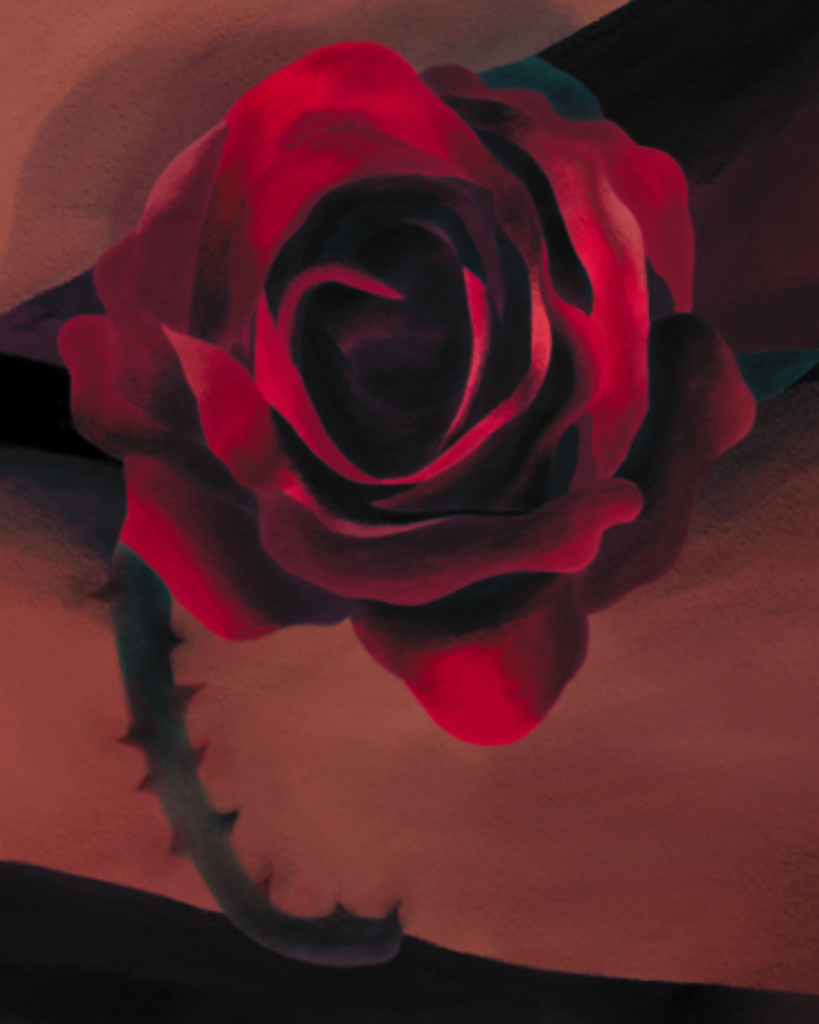
a close-up on “Rose”, original artwork by Gabrielle Lopez (2021)
It wasn’t until recently that I realized that I wasn’t the only one with a body like this—flat-chested, petite, small, “lacking”. A body that’s out of the norm.
It all started when I stumbled upon a local lingerie line, though sadly, they’re out of business now. And because I’m not writing this as a promotion, I’m not going to mention the brand or the owner’s name. Either way, call it capitalist and in turn anti-feminist, but it was with them that I realized for the first time that brands can be meaningful ventures, too. That I’m not as lacking as everyone has made me out to be.
The owner had a body like mine—flat-chested, petite, small. But did I ever see her as “lacking”? Never. I found her to be beautiful, especially in her confidence that I could sense in the photographs and in her bravery that resonated with me in her posts, writing about her journey with her body, and making something out of the struggle. I never knew until I saw her that it was possible to be like this—flat-chested, petite, small—and still be confident, beautiful, sexy.
Seeing her work—she tailored custom lingerie and modeled her own pieces—it was the first time I honestly, truly felt empowered. And wearing her work, it was the first time I started to feel good about my body. For once, I wore a bra that didn’t feel uncomfortable or didn’t make me feel and look so lacking. For once, I wore something that felt like a second skin—and I finally felt comfortable, even confident, in my own skin. In my body.
Flat-chested, petite, small—whole.
I am not alone. I am not less.
I started to look everywhere around me and see that indeed, there are more like me. I’d see girls—women—at the beach wearing bikinis with a body like mine, and I’d light up with the feeling of finding kindred and the thought, “She’s just like me.” I’d see models online with this exact body type, and I’d think, “See? They can do it, have a body like this and still be confident, admired. They’re not any less beautiful because of their body. They’re beautiful exactly because of it.”
I am not alone. But maybe it’s also wrong of me to think that they have a body like mine because no body is the same. Their body could only be theirs as much as mine is solely, wholly mine.
For once, I wore something that felt like a second skin—and I finally felt comfortable, even confident, in my own skin. In my body.
Flat-chested, petite, small—whole.
I am not alone. I am not less.
I am beautiful.
I started to look everywhere around me and see that indeed, there are more like me. I’d see girls—women—at the beach wearing bikinis with a body like mine, and I’d light up with the feeling of finding kindred and the thought, “She’s just like me.” I’d see models online with this exact body type, and I’d think, “See? They can do it, have a body like this and still be confident, admired. They’re not any less beautiful because of their body. They’re beautiful exactly because of it.”
I am not alone. But maybe it’s also wrong of me to think that they have a body like mine because no body is the same. Their body could only be theirs as much as mine is solely, wholly mine.
I am not alone. I am beautiful. There was never anything wrong with me. I am exactly right the way I am. My body is enough as it is.
Maybe the pictures and the icons always depict a woman with a slim, hourglass shape and generous, sensuous curves. But the reality is we all have different bodies, and that doesn’t make any of ours abnormal, ugly, lacking. Just because we differ from the norm, the usual, doesn’t mean we are any less.
The differences in our bodies don’t make us less woman, less man, less human. We make ourselves what we want to be, not by what we look like or by what society deems is right and beautiful.
It helps that by the time I’d started appreciating my body more, I’d had a different partner already, one I can honestly say is a partner in the truest sense of the word in that he supports and respects me for all I am. To my surprise—even though it shouldn’t have been a surprise in the first place—he loves my body exactly as it is. I wish I could easily say the same thing about myself as he does, but to this day, it’s still a challenge. Some days hit harder than others.
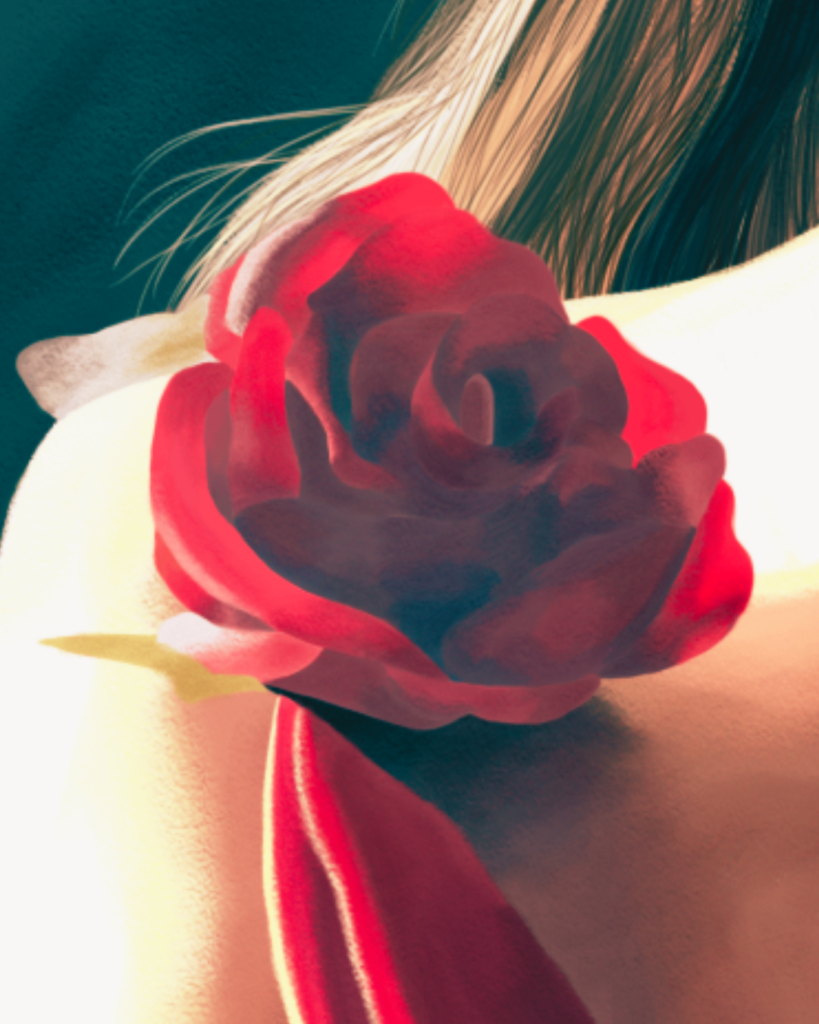
a close-up on “Rose”, original artwork by Gabrielle Lopez (2021)
Maybe the pictures and the icons always depict a woman with a slim, hourglass shape and generous, sensuous curves. But the reality is we all have different bodies, and that doesn’t make any of ours abnormal, ugly, lacking.
The differences in our bodies don’t make us less woman, less man, less human. We make ourselves what we want to be, not by what we look like or by what society deems is right and beautiful.
I hadn’t realized how much the issue of my body has affected me until one day, I found myself at a women’s clinic, face to face with an Ob-Gyn doctor. I was there for a different purpose, but toward the end of my session, when she asked me if I had any more questions, I suddenly found myself thinking of the one thing that has always haunted me but I’ve never given voice to. Like it’s been waiting all that time for somebody to ask, to listen to it, to genuinely care and assure.
In that moment, sitting in front of a woman whose job is to examine bodies all day, for once in my life, I wanted to talk about my body.
I’d been meaning to ask this one question, but I’d never dared to. How could I when everybody seemed to be so clear about the answer already?
“Am I normal?”
Then I followed it up with an explanation and the usual self-deprecating laugh I’d learned to treat the subject with, “Because I literally have no boobs.”
A part of me immediately regretted it. I felt like crying all of a sudden—I almost never cry to anyone, I hate it. It was hard to speak even if I wanted to take it back. Why did I have to give voice to something that could have been avoidable, unnoticeable? All this time, I didn’t ask, didn’t voluntarily talk about my body because I was always afraid that if people didn’t notice it before—which was also impossible; I always thought it was the first thing people noted about me, this inherent, undeniable lack—then they would notice it now. And I would have made them see exactly how incomplete, unattractive, ugly, and odd I am.
But I asked that doctor, and I felt silly for bringing it up at all. Surely, it wasn’t an important matter. I was right to not talk about it all these years, so why talk about it now? I was putting more attention to my flaw, I might as well have lain there on the examining table under a bright light and offered her the magnifying glass right to where I’m imperfect, vulnerable, weak.
In that moment, sitting in front of a woman whose job is to examine bodies all day, for once in my life, I wanted to talk about my body.
I’d been meaning to ask this one question, but I’d never dared to. How could I when everybody seemed to be so clear about the answer already?
“Am I normal?”
I was so tortured about my body I hadn’t realized I was broken at all until I heard the answer, and it felt like I was being mended back to a whole.
“You’re normal.”
That’s what she said.
Up until that point—two whole decades of my life—I never asked, so I also never knew how comforting it was to be reassured, validated.
The truth in those words is all that matters, but I think in my heart, I would forever bear the wounds of those other older words saying otherwise. I might have healed, but this appreciation of my body is still very new. To this day, I have moments where I look at other girls and envy them, where I look in the mirror and see what I don’t have instead of what I do. I see the lack. I hear those old words. I can feel the judgment of people on me. I think they will always be a part of me.
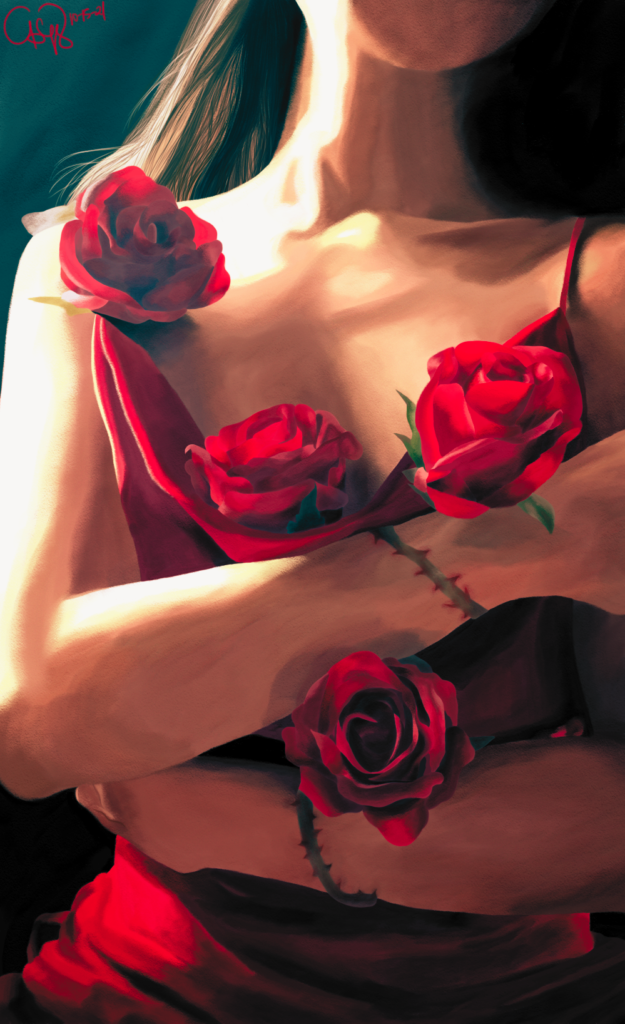
a close-up on “Rose”, original artwork by Gabrielle Lopez (2021)
Internalized standards on beauty are hard to get out of when it’s the only mold available in society to fit yourself into. But I have learned to slowly step out of what I’m made to believe I should be and step into my own skin into what I am.
I don’t presume to know that I’ve shed that image, that idea of what my body should be. Internalized standards on beauty are hard to get out of when it’s the only mold available in society to fit yourself into. But I have learned to slowly step out of what I’m made to believe I should be and step into my own skin into what I am. I have learned to accept my body, to love it and see the good in it, but more importantly, to take care of it. It hasn’t been easy, but it is enough, and it’s a step in the right direction.
Though as comforting as it is to know that I am not alone, that there are others out there struggling with a similar experience, it is even more heartbreaking that we’re ever made to feel ugly at all. Not enough. Lacking. Odd. As empowered as we can get as individuals, the progress would be slow if we, as a collective, still hold to traditional ideals that there is only one kind of beautiful, and everything short of it is unacceptable.
Maybe we don’t embody the norm, but we are normal.
We all have different bodies, but these differences should not make us any less worthy of respect and appreciation. We are beautifully enough as we are.
Maybe we don’t embody the norm, but we are normal.
Bodies may be temporary and physical, but our bodies are inherent. It’s time we stopped shaming each other for something as essential to our existence as our bodies are. Our body is where we live, how we carry ourselves, how we move through the world. And yet, it is also paradoxically not all that we are. So why define each other simply by how we look like, how we are shaped? We are worth so much more than the curves in our bodies, the imperfections on our skin, the things we have between our legs.
We are beautifully enough as we are.
It’s time we stopped shaming each other for something as essential to our existence as our bodies are. Our body is where we live, how we carry ourselves, how we move through the world.
It may look skin-deep, but our perception and appreciation of our body—or lack thereof—is soul-deep.
Still, the matter of how we see our bodies is not superficial. I should know. I’ve spent my whole life either avoiding mirrors or looking into them only to see what’s wrong with me and wishing I had “the perfect body”. It may look skin-deep, but our perception and appreciation of our body—or lack thereof—is soul-deep.
I write these words because no one wrote them for me before. Instead, what I got was a variation of comments about how my body isn’t enough. So to anyone who needs to hear these words, these are for you. You are normal, but more than that, you are extraordinary for your unique body, your specific soul. You are more than enough, and you are beautiful as you are. You are worthy of care, so start with yourself.
Words—whether or not they are jokes said even at the right time at the right place, be it by someone close to us or by a stranger—mean a lot. Words engrave themselves into our memories as much as actions do. Words affect the way we see and treat ourselves, as well as other people. We need to be careful about what we say, no matter who we say them to.
Maybe I’ll always hurt, but maybe I’ll also always heal.
With the right words and the right care for our bodies, we all can.
You are normal, but more than that, you are extraordinary for your unique body, your specific soul. You are more than enough, and you are beautiful as you are. You are worthy of care, so start with yourself.
Read Next
We all know how painful and unpleasant menstruating can be, so why not feel as good about it as we can while we’re…
Why are we so against growing old—looking old? When we think of beauty, we think of someone young. Snow White wasn't old when…
The Muse Inks
© 2025 The Muse Inks. All Rights Reserved.
